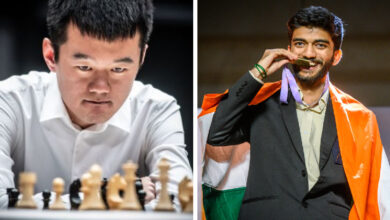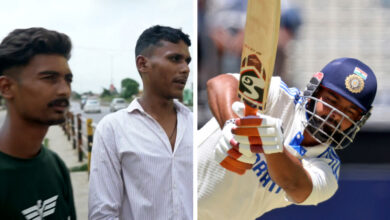Why was Spain’s women football coach Jorge Vida celebrating alone without his team? Why did the crowd boo him? | Football News

For the first time in their hory, Spain have won the Women’s World Cup. A month ago, that had seemed improbable. A year back, verging towards the impossible. Back in September 2022, a mutiny within the Spanish camp had led to 15 players stating that they didn’t wish to be selected for the national side. ‘Las 15’, they’d come to be known as. The mutiny? Demanding changes be made to the national team set-up, putting under scanner head coach Jorge Vilda, in whose tenure the national side had failed to win a championship knockout match since 2015. They’d win four in a row this month. Unfortunately, that and a trophy to show for hasn’t been enough to subside the series of events that have taken place behind the scenes.
The strains between the manager Vilda and his staff, who received the backing of the Spanish FA, and the players, who didn’t, have been rather obvious and awkward. Visuals of the Spanish manager celebrating a semifinal win all himself were followed more of the same on Sunday when his team beat England 1-0. There’s that video of the 42-year-old dancing, surrounded his own players, none of whom acknowledge his presence until he fatigues down and stops. It’s not a good look but Vilda hasn’t helped his case.
On the final’s eve, when asked the press how he managed the ‘issues’ within the dressing room off the pitch, the head coach decided to respond in three words. “Next question please.” The headline on the Marca front page earlier that day spoke more, “It annoyed me that people questioned my honor.” That Vilda was willing to pass the usual ‘mum’s the word’ policy of coaches ahead of big games and peel into an issue that had scarred his side for months, said something. That he was booed a majority at Stadium Australia before and after the game – even during the medal’s ceremony while every other player was cheered – said more.
Then there’s the Spanish FA. Represented chief, Luis Rubiales, the national football governing body was already under scrutiny for the incessant backing of Vilda over players, who complained of ‘a general feeling of discomfort’ under his regime. One would think their team winning the World Cup would be the ideal moment for them to divert the attention to the action on pitch. Rather, Rubiales kissed Spanish forward Jenni Hermoso on the lips at the trophy ceremony, to which the latter responded on her Instagram live from the dressing room, “Eh…yeah, I did not enjoy that.”
Aquí el fotograma del posiblemente delictivo acto de Rubiales. A ver si la FIFA me tumba esto también. https://t.co/PSMLrZ1DvL pic.twitter.com/zhhSE2XnAK
— Pablo Echenique (@PabloEchenique) August 20, 2023
At the end of the final whle, one could almost feel for the players, who struck a compromise at these times of crisis. While most of the Las 15 stood their ground and kept themselves unavailable for the World Cup squad, three would return to join the camp – highlighting the differences between the players as well. Full back Ona Batlle’s take on the situation for The Athletic explained a lot, “You don’t have to be best friends with your team-mate to coordinate on the pitch”.
Excellence on pitch
On pitch, Spain produced globetrotting levels of attractive football. Ask yourselves, what makes for a likable tournament campaign? Wins and goals? Spain had both, and more. Finishing with most goals, 18, they looked in control of the game more often than not. Barring the 4-0 defeat to Japan, their DNA style of short and tight space passing coupled with an unwavering commitment to attacking the opposition goal was a sight to behold. Even in the summit clash.
Seven out of Spain’s starting eleven were Barcelona players. That incredible-La-Masia-imbibed spatial awareness was visible on multiple counts. A sequence of one touch-two touch passes that sprung open play offloading the midfield and inviting opposition numbers before setting free wide and forward players in the final third. It was what the Spanish men’s team did to get their share of goals during an era that saw them win back-to-back Euros and a World Cup. But unlike that 2008-2012 team, it wasn’t the only arsenal this women’s team had to create openings.Most Read
1
Asia Cup 2023 Team India Squad Announcement: Shreyas Iyer-KL Rahul back, Tilak Varma receives maiden ODI call up
2
Aamir Khan showed up at my one-room-kitchen at midnight because he was not satisfied with a scene: Mushtaq Khan
See More
With their only goal of the game, scored a Real Madrid player, Spain demonstrated how they could hit with direct passages of play. Olga Carmona, the youngest of her side’s three captains at the tournament, had scored just once before Sunday in her international career. As a left back, one could question if she had the instinct to go for goal, especially in a game of this sort. She had little time to think before applying her touch. England lost possession of the ball in the midfield, a long pass switched play to the left and her overlapping run was spotted a cross pass from Caldentey to the edge of the box. Seldom is the importance of deceleration in football runs given weightage. Here, it must be. Instead of having an extra touch, Carmona decided to go for a first time shot. She’d take the extra second in lacing her left foot instead, for a first time finish. Just a hint of a drop in the pace before she struck it low and just inside the far post. A bigger delay and Alessia Russo may have snuffed it out. She couldn’t.
A one goal advantage may have been enough for Spain to pull through but the one make they didn’t make after going up in the first half was to lend the momentum to England. One after another, came a wave of raids in the English territory. Right to the end. According to Sofascore, the ball only stayed in the Spanish defensive third for 29 percent of the match. It was likely a lesson learnt from last year’s Euros, when Spain – despite having dominated the quarter final for the most parts – conceded late in the regulation period before losing in extra time. A modern day depiction of attack being the best form of defense, in a World Cup final. Isn’t that what should really be said about this win? The play, and the players. Oh definitely the players.
Salma Paralluelo? The 18-year-old who has now won the World Cup, the Champions League and represented Spain in Euro Athletics games before that. Or maybe Aitana Bonmati, referred to as the Andres Iniesta of women’s football, who’s carved out her own brand as one of the game’s finest midfielders. But most definitely, Olga Carmona – who led Spain to their first world title. Who dedicated her final-winning goal to her best friend’s mother, who had passed away recently, only to discover after the match that her own father was no more. At the end of a first-ever 32-team Women’s World Cup, which proved that more teams can play in the marquee event with its many plot tws, isn’t it tragic for the winning side to be marred off the field issues? One can only hope that Spain’s win in the midst of the chaos with their FA serves as a cautionary tale for others, maybe even themselves.







